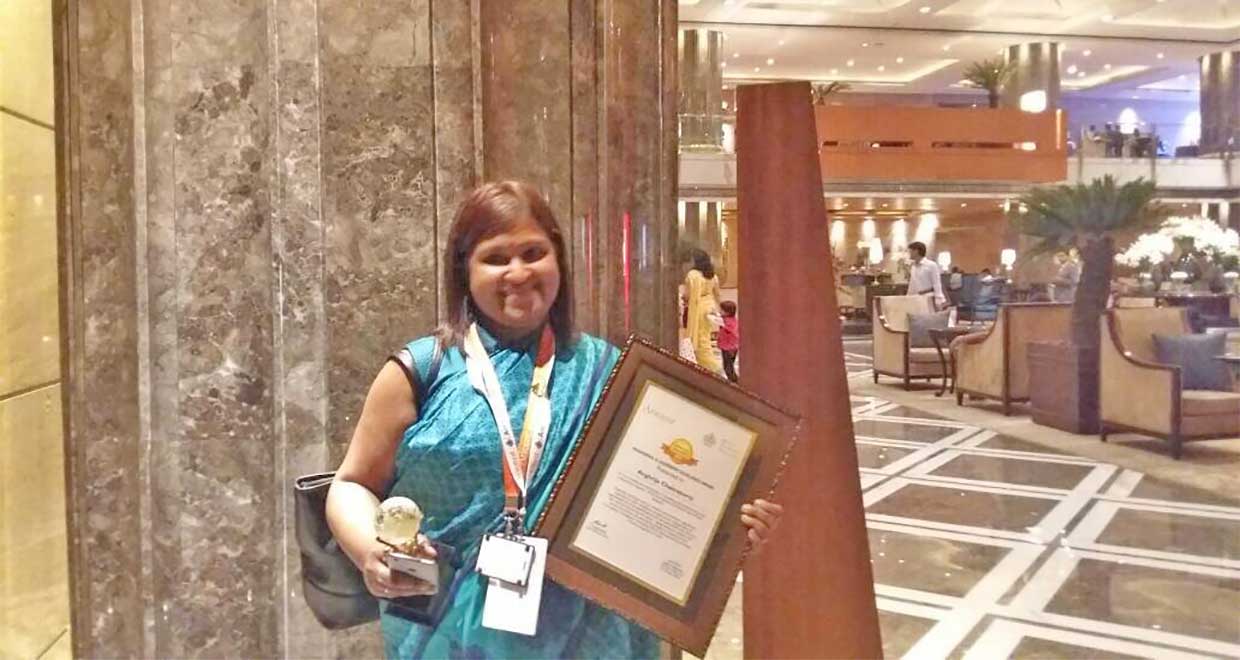Anghrija Chakraborty, graduated in Law from Campus Law Centre, University of Delhi in 2008. Coming from a family of doctors and engineers, her fascination for the working of the wheels of justice motivated her to pursue a career in the legal industry. She firmly believes that if work is done smartly, you can still find time for “Netflixing”- her major stress buster.
Anghrija joined Aricent as a Manager in June 2015 and was promoted to Senior Manager in July 2016. Her chief duties are planning, implementing and monitoring all corporate compliance programs. Co-ordination of compliance audit activities and communication of expectations and reporting results are the key functions of her position.
In this interview, she gives us an insight into:
- Tricks to approach academics without having a mental breakdown.
- How to make the most out of internships?
- Importance of work ethics.
- Indispensable message to the budding lawyers.
How would you like to introduce yourself to our readers?
I’m a legal and statutory compliance specialist. Occasional writer. Dreamer. Thinker. Random lover of all things breakfast-y. Total snark with a heart of mashed potatoes. Bad photographer. Charmingly neurotic. An absolute, but barely controlled, legal research junkie.
What prompted you to study Law after completing your English Honours from Miranda House, University of Delhi?
I had always been interested in the dictates of justice, and I genuinely found Law fascinating. Therefore, it was easy-peasy. Of course, there were several other reasons – (i) I could represent myself in court if push came to a shove; (ii) because movies and TV series gave me no choice (read, Ally McBeal, The Practice, etc.); and (iii) because I wanted my grandparents to have something nice to tell their friends.
Which activities did you partake in and how did you approach academics while in college?
Law school, I believe, is akin to cooking for the first time. You have absolutely no idea what you are doing, and it is a bit of a mess. But just like cooking, you get better at it with time. During my time at law school, I learned a few things that helped me sail through.
Make one page summaries every week.
One of my professors at college once said that a good lawyer can explain their case in one sentence. I say a good law student can explain their lectures on one page. A one-page summary will force you to do three things: (i) re-read your notes over the week (ii) think about the important details; and (iii) rewrite your notes in a simplified form.
Use colour (lots and lots of them).
When you make a one-page summary, or your notes, use colour. It helps you find key words easily, and also distinguish between different topics. Not to mention, it is easy on the eye and a colourful way of immersing your desk with law notes.
Keep a balance.
Burning out from studying too much and cramming because of studying too little are two things that one should avoid. In both instances, you can study for so long before you start hitting diminishing returns and your brain begins to sizzle. Law school has taught me that a ten-minute break every hour is a good rule of thumb to stick to.
Test yourself (can I explain this to a friend?).
If you can explain why positivism is at odds with naturalism to a friend, then you can do it in an exam. Why this works? – (i) You must know the content to explain it; (ii) You must explain it so that it makes sense. Two important skills in any law exam.
Be friends with a ruthless proof-reader.
What you want is someone who will destroy your essay/assignment if it is awful rather than calling it “scholarly and erudite.” Here is a suggestion – either print your assignment or read it out loud. That is the best way to avoid being ½ marks off an A.
Be friends with a law school senior.
This is important. A friend who understands the struggle, and who is also able to give you assessment advice is something money cannot buy. Taking the initiative when the opportunity comes up and being genuine would be my two cents when it comes to befriending a law school senior.
At law school, apart from the regular academic coursework, I found myself in the library, reading up, or volunteering with blind students at the Braille Institute Library next door, or helping set up meetings and events organized by the Gender Justice Society.
What were your areas of interest during your graduation and how did you go about developing expertise in them?
To be honest, I did not have a favourite subject or area during law school. I remember that legal research on various topics interested me. Therefore, I read a lot, and then worked on my research skills. After law school, in my different jobs, I worked at strengthening my research skills, and continued reading a lot, leading to my eventual interest in data privacy, anti-corruption, anti-trust, ethics, etc.
How is internship helpful for a law student and what kind of internships did you do during your law school days?
I remember my first days in law school. I had this air of confidence, quite like Harvey Specter. I had good grades in college, and I had made it to law school. I felt extremely proud of myself. That was until I started talking to my peers and seniors. One had already worked at the Attorney General’s office. One had already nabbed an internship at a top tier law firm. I remember wondering in second year if I should just drop out of law school and take up something less daunting, like, nuclear physics or rocket science. After all, how could I compete with these people when I had no legal or internship experience? I really thought that evil HR managers would just show me the door. But this is not what happened/happens.
I figured later that most legal workplaces are on the lookout for people who can think on their feet, can interact well with clients, and are not afraid of hard work. And these are skills that are not contingent on you having done an internship or not.
In fact, there are several non-law things that you can do, which will count as good experience when you apply for a highly coveted legal job:
You could get involved in campus life – join the law society, become a student ambassador, join a volunteer program, become a mentor or a research assistant for your professor.
You could volunteer at charities – find a cause you are passionate about and start devoting time in helping those who need help. It shows that you are compassionate and have varied interests. Also, this would make you stand out in law firms that do pro-bono work, or companies that have good corporate social responsibility functions.
You could organize a successful college event – may be a fundraising one. Such events are fun, and they showcase your management and leadership skills too. They also demonstrate that you work well under pressure and can meet deadlines. These are skills that all employers look for.
You must remember that work experience is not just about having an impressive resume; it is also about personal development.
Personally, I pursued a post-grad diploma in Human Rights Law, International Humanitarian Law, and International Refugee Law, organized various events under the auspices of the Gender Justice Society, volunteered at the local orphanage, pet shelter, and the Braille Institute Library.
Did your law school education prepare you for the many tasks required to execute during your internships and later at your job?
Okay, let’s ponder over this.
When I graduated from law school, as part of my usual delayed process of unpacking significant life moments, I began to consider what I had achieved/learned. It was actually not the first time I had to ponder this question. I was the one in a family of doctors and management graduates and engineers that bucked the trend and made the decision to study Arts and Law. I would occasionally be asked, what is it that I learned? My answer was that I learned to read and write really well.
Jokes apart, it is hard to explain what you learned at law school. I did not learn how to design a building or cure a disease. I learned how to navigate the many invisible lines in the sand that made up the accepted rules and behaviours in society.
Law school helped me to apply the scientific method, in that you ask a question, carry out research, construct a hypothesis, test the hypothesis and draw conclusions based on the results. Law is a product of this same process – however, in core law subjects we consider this process in reverse. We start with the legal rule, read the cases that have tested it, then perhaps the jurisprudence and policy that explain the academic and research perspective of the rule, and, lastly, the social wrong or problem which posed the question in the first place.
Also, you learn to differentiate between a fact and an opinion, and then between a conclusion and an assumption. This makes us discerning and compelling. It also gives us the skills to contemplate the vast ocean of media that drowns us day to day. The rules of admissibility and evidence are not only useful in the courtroom, the habitual cognitive practice of considering “hearsay”, relevance” and “fact over opinion” when gathering our thoughts allows us to be more concise, effective and persuasive communicators. Conversely, it also equips us with the ability to think critically when we are being communicated to.
As law students, we learn not to think in isolation and write manifestos and treatises fit only for academia. We are on the ground, thinking and contributing to very real discussions and responding to very real problems.
As a member of the ISIL delegation to the WFUNA Asia-Pacific Model United Nations Conference, in Delhi (in 2006), share your experience.
This MUN Conference was organized in 2006, and it was a lot of fun. So, let me tell you the story. As a kid, I was extremely fascinated by what went on in the United Nations – the Security Council meetings’ snapshots on the news, etc. In fact, there was a time when I actually dreamed of being the Secretary General of the United Nations. Well, I digress. So, when this opportunity came up, I just grabbed it. Not only did it provide me with a platform to discuss global socio-economic issues, and get a mind-share from individuals around the world, but it also gave me lifelong friends in the team-members that I worked with. Basically, you meet new people, you go to new places. You get over your fears of facing the public. You become acquainted with global issues. You learn diplomacy and negotiation skills. You can enhance leadership skills. You can also leverage the MUN experience and network to get into college or find jobs.
How difficult would you say it is changing workplaces and creating a comfort zone all over again?
(Previously, she has worked as Manager at GRC, Risk Assurance – PricewaterhouseCoopers India and Manager, Engagements, Corporate & Compliance Solutions, Pangea3 – A Thomson Reuters Company.)
Honestly, I had no issues. Both companies really invest in their people, and juniors usually get fantastic training, and more importantly, a lot of one on one time with seniors, learning from their experience. Also, in both these companies, everywhere you look across, there are bright, talented people and whenever you need help or you have a question, there is a rush of people wanting to help. To have that sort of knowledge and experience essentially at your fingertips is phenomenal.
You joined Aricent as a Manager in June 2015, and were promoted to Senior Manager in July 2016. What contributed to this shift?
Before Aricent, my job was mostly legal and regulatory research and writing. Compliance was a much smaller element. Also, I was more of a consultant, and therefore, I was not really at the trenches, my sleeves all rolled up. Therefore, I knew I wanted a change.
My job at Aricent requires me to formulate, implement and monitor corporate policies and processes relating to compliance, to train employees on compliance, and to monitor subsequent company and employee behaviour. Further, it has helped me develop a skillset comprising of project and business management, relationship development, strategic understanding and more enhanced communication skills.
Are there new challenges every day or did work fall into a predictable pattern?
My initiation into work-life was swift. I learned e-discovery within a week. By month end, I was a Westlaw pro. I was doing contract reviews in a year. By the end of my first two years, I had presented to client teams on misleading and deceptive advertising and other regulations.
As a legal and statutory compliance specialist for a multinational corporation, I can be involved in advice and transactions running anywhere from data privacy to anti-corruption, anti-trust, labour compliance, supply chain compliance, and everywhere in between. I like to compare it to an exotic smorgasbord – I have a tasty pick of matters from the US, the EU, and rest of the world. The variety and constant challenges in new areas of the law are what I thrive on. In house lawyers and compliance specialists also get to flex outside of the law, and may assist in company secretarial duties and initiatives to cut costs or time to access legal services. I like to call it “cheerleading efficiency.”
Of course, this all sounds pretty peachy. It isn’t always like that. Sometimes I work long hours. However, the flexibility is good. As I am an early riser, I am in office quite early, and can leave with a little daylight left to satisfy me. Calls with the US are either early in the morning, or early in the evening, and Europe comes after lunch. There is plenty of time for mind-calming yoga (or vegging on the couch for a Netflix marathon) in the early evenings.
I have not seen many cons so far. I have gained invaluable experience with stakeholders at all levels of a business. I have learned that “no” is not an option (alternative solutions are always welcome though). And, there is access to a never-ending supply of varied legal matters and projects.
Having a lot of publications to your name; how do you manage to find time to write besides your various engagements?
I have always enjoyed writing. I will usually find time to write for about half an hour or an hour in a day. If not, then I blog. You won’t believe this but there is a reason why I love my job – it requires me to draft policies and processes all the time. Also, you won’t ever “find” time; you must “make” time.
What is your approach to that maintaining a work-life balance?
Well, honestly, the hours are quite daunting, and well, you cannot always avoid them. However, there are a few things that will help you get through the day like a pro:
Turn off the notifications on your phone and minimise distractions. This helps you to focus and finish your work timely.
Take breaks – they clear your mind so you can focus on the tasks at hand.
Create checklists of things to do, and prioritize.
The most important thing is to de-stress at work. What I do:
I pick up a colouring book and colour my stress away.
I go for a short walk – it clears the clutter in my mind.
I catch up with my colleagues, or make a short call to a friend.
I watch animal videos – they are short. Additionally, cute videos of corgi butts, pandas with no spatial awareness, fluff balls running around, and cats who knock glasses off tables always de-stress me.
Like I said before, you have to “make” time. If you can manage your time well, you will have enough time to “Netflix” your way through the evening, or do whatever you like.
What do you want to say to the next generation lawyers on the growing areas of Law where he/she can focus?
Honestly, there are just so many options now. All I would like to say here is that you should relax and not worry so much about what others are doing. There is a lot of pressure on later year law students (and much of it is self-inflicted) to have a clear career plan after graduation. In reality, nothing could be farther from the truth. The best piece of advice anyone has ever given me was to stop worrying about the future because “there is not one right way to go through life.”
Ignore what everyone makes you think you should achieve in your career/life by forging a unique path. I actually took a year’s break during law school, before I finally completed. In that period I did not lose pace with my peers, nor did I have challenges in starting again where I left off or while starting my career, but I did gain the world.


























